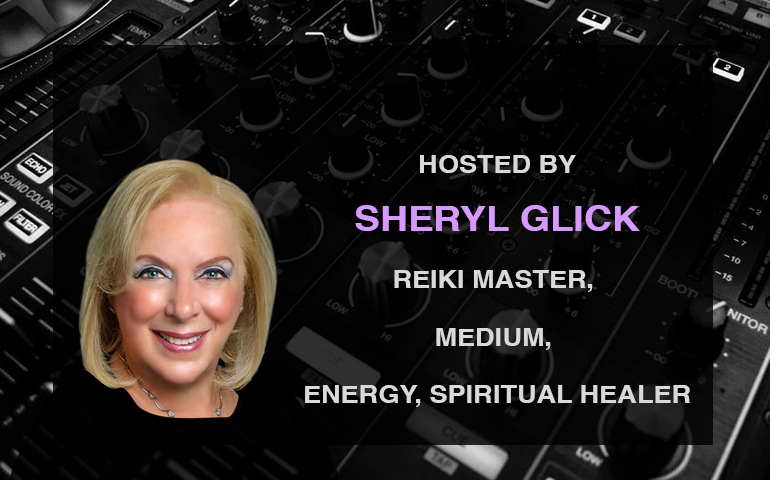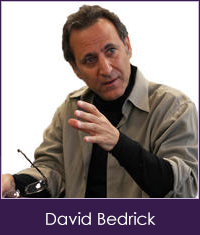Internet Radio Show
Foundations for A Love Based Psychology
- David Bedrick
- Download
- Click "" below to listen

In today’s episode of Healing From Within your host Sheryl Glick welcomes David Bedrick author of Talking Back to Dr. Phil—Alternatives to Mainstream Psychology. In this innovative book by David who is a counselor, educator and attorney, we are introduced to a fresh approach for understanding disturbing feelings and behaviors. Using examples from Dr. Phil’s television show David shows methods which may help to open people’s minds and hearts and offer new approaches for creating healthier relationships. Resorting to blame, embarrassing or compromising judgments are often the fallout from mainstream psychology methods which seek to find causation first, and then develop new behaviors to correct long standing issues. A tough love approach may be used at times, and sometimes lead people to feel shame about their role in any dysfunctional relationship. They might also think something is wrong with them causing further loss of self-esteem and confidence. David goes on to debunk many standard protocols and temporary fixes used by the health community. Instead he suggests offering clients ways for self healing through acceptance and assuming responsibility for their actions. In discussing common topics such as dieting, sex, anger, addictions, domestic violence and other issues that limit joyful and healthy outcomes, we are able to see that our struggles must be rethought, reframed, and refined leading us out of fear and limitation to a higher view of Self, others, and a new way to look at society’s role in condoning or re-enforcing some of these dysfunctional patterns of behavior.
In discussing the larger cultures formative role in our development, we can become aware that suffering is often based on the judgments and beliefs of other systems and perspectives not necessarily our own. It would be helpful in following intuitive messages: learning what is acceptable or right for us, and learning to stand in our own divinity and truth. Allowing others the right to do the same would be a big step towards resolving many unhappy outcomes. In mainstream psychology with its roots in allopathic medicine, people’s difficulties are often seen as symptoms of illness: feelings and behaviors outside of the norm are seen as needing to be suppressed or eliminated. However, exploring the underlying messages in feelings and behaviors could aid in personal transformation and allow us to see beauty, personal power and intelligence in DIVERSITY. Often accommodation is contrary to the nature and life path or destiny of individuals..for example: Steve Jobs and Bill Gates left college early and who could have imagined without a college degree or advanced degree that they would develop new industries in the communication field. As we are the product of our early training and conditioning by society, family, religious and educational institutions and are encouraged to incorporate their many values into living our lives, we may lose sight of our personal goals needs and destiny. We may judge what is right for the majority to be adopted and enacted by us and everyone. Then we may have negative feelings for those who develop other ways to prosper and thrive. In trying to be what others expect of us, we create physical and emotional problems leading to health issues, suffering and losing our natural state of joy and happiness.
David goes on to discuss in detail a look at what he calls The Obesity Myth as diet and weight loss are topics of everyday conversation and national concern. David shares some important statistics relating to the childhood obesity crisis. From an article on ABC it was stated that 18 percent of children age 6-11, and 36 percent of adults are obese…but this is not the whole truth. What is more disturbing are the perceptions and unrealistic views of many people in regard to what constitutes a healthy view of our bodies and how we take care of ourselves…Approximately 50-70 percent of normal weight girls think they are overweight, and 81 percent of ten year olds are afraid of being fat..what ideas and values by parents, the media and the food industries are fueling this fear and unnatural emphasis on our physical lives..the spiritual connection to compassion and joy is lost in this narrowed view of body image. Obviously many mothers and fathers with unrealistic views of what constitutes true health along with an obsession for staying young might be influencing the younger generation. Approximately 97 percent of women are cruel to their bodies, and the message by the media that American’s need to diet is” bad medicine” for girls and women who have internalized the message they are fat.
Another hard fact….About 8 million Americans have an eating disorder. The health issues over time related to obesity are real, but the health risks of having an eating disorder are WORSE.
The mortality rate associated with anorexia nervosa is 12 times higher than the death rate of all other causes of death for females 15-24 years old. An estimated 300,000 deaths per year are due to the obesity epidemic and diseases related to that, while an estimated 480,000 die of eating disorders.
Sheryl is reminded that Karen Carpenter a song writer and performer died from heart failure in her late 20’s due to an eating disorder. Her heart obviously needed to be nourished by a greater sense of self- love and compassion, gratitude for gifted life instead of the constant worry about her body. Her songs reflected this desire for a more loving society and we as parents, healers and educators should be placing emphasis on these values ensuring our children experience the joy and uniqueness of their lives.
Another hard fact….The 60 Billion Dollar Diet Industry has at most a success rate of 5-10 percent. The question is “ Why don’t diets work?”
David suggests that people naturally resist shame and criticism and just telling them they need to lose weight is ineffective..some deeper psychological and critical thinking along with a wellness plan which includes stress reduction methods, exercise planning, improved relationships, joy in new activities, and views of acceptable goals, along with a more realistic view of one’s body type and what is possible for them to achieve, might be contributing parts to this paradigm.
David shares the terms Naturalist…Respect…and Radical Beliefs words and actions of a love based psychology viewing people and their difficulties through a lens of love. The term Naturalist assumes that nature reflects order, intelligence and beauty. Respect is the willingness to look and look again..so respect entails a careful and caring examination of people’s experiences precluding a rush to diagnosis, awakening curiosity about what is observed and how it might reflect their deeper needs, and the potential for transformation. Radical Belief is the faith that even our greatest difficulties and behaviors are informed by intelligence.
Most of us fail to realize that our personal norms have more to do with our culture and biases than any underlying pathology: without understanding that certain behavior we engage in on a regular basis has made us uncomfortable. We may be intolerant of the diversity that is being expressed. Just because a person’s behavior or experiences deviate from accepted norms does not mean they are not healthy. Their odd behavior could be a sign of healthy change for their circumstances or even a sign of genius rather than pathology…in short allopathic thinking and diagnosis can make people think they are sick for expressing their individuality or growth potential.. Sometimes we might even see entire groups who differ from the mainstream as deviant as has been the past identification with homosexuality etc.
David and Sheryl discuss an episode of Dr. Phil’s show and how “lying” was seen by mainstream psychology as a problem created by individuals rather than co-created by numerous individuals or social systems. Sheryl remarks that according to many studies it is thought that all people lie on occasion. Reasons may include the fear of disappointing someone or needing to be supported emotionally, financially, or sexually, and “lying” may be part of maintaining the relationship. This is how most co-dependent relationships survive but do not necessarily thrive. Mainstream psychology expects individuals to be wholly responsible for themselves often ignoring the large part that social systems play in our individual reactions to challenging events.
David implies that the behavior of women who step outside society’s normative gender roles may be seen as pathological and this goes on all the time. In other words “The Boys Club” mentality still tries to hold power over women in professional or intellectual social or religious arenas of life.
David speaks of one of the founding fathers of psychology, CG Jung who wrote “Everyone carries a shadow and the less it is embodied in the individual’s life, the blacker and denser it is.” And then Jung further expressed…”relegating aspects of ourselves to the shadow makes us strangers to ourselves and more inclined to see these qualities in others….” It seems the more we deny the existence of these darker or denser qualities in ourselves the more fuel we give to our judgments of others who we may view as having moral failings and inferiorities in contrast to ourselves. In its most vicious form, this dynamic dehumanizes others and subjects them to injustices as has been the case with all vilifications of people throughout history.
In light of these concerns David wrote..”Exploring judgmentalism would lead to comprehending the power that shadow and projection have on societal campaigns to marginalize and dehumanize entire groups of people from indigenous nations, women, and people of color to the mentally ill, the poor and even children. The inclination to vilify groups of people is among the greatest challenge worldwide and understanding how denial creates shadow(dark impulses) and leads often to projection.
It is only through learning to observe ourselves and our own motivations those driven by lower instincts, emotions ,and fear, and those lead by compassion and love, that we can begin to operate from a love based interaction with life, ourselves and others, and learn to accept each individual soul’s right to explore their own destiny and or Karma, making choices which we may or may not concur with, but which will lead them to experiences that are right for them. There is profound meaning in our struggles, life is not random, and when we face our shadow side: our deepest fears, we can compassionately rethink, reframe our thoughts and actions, leading us to create a healthier more loving life experience.
